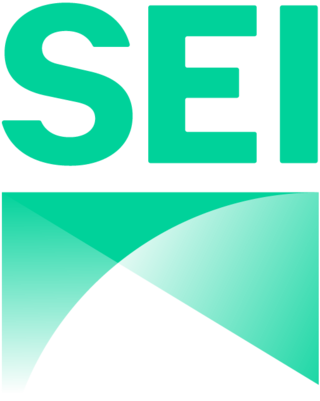Top Qs
Timeline
Chat
Perspective
Stockholm Environment Institute
From Wikipedia, the free encyclopedia
Remove ads
Stockholm Environment Institute, or SEI, is a non-profit, independent research and policy institute specialising in sustainable development and environmental issues,[1] with seven affiliate offices around the world.[2] SEI works on climate change, energy systems, water resources, air quality, land-use, sanitation, food security, and trade issues with the aim to shift policy and practice towards sustainability.[1]
This article has multiple issues. Please help improve it or discuss these issues on the talk page. (Learn how and when to remove these messages)
|
SEI wants to support decision-making and induce change towards sustainable development around the world by providing knowledge that bridges science and policy in the field of environment and development.[1]
Remove ads
History
SEI was established in 1989 as an initiative of the Government of Sweden.
Activities
Programs
- Ecological Sanitation Research Programme
- LEAP: Low Emissions Analysis Platform
- Regional Air Pollution In Developing Countries (RAPDIC)
- Resources and Energy Analysis Programme (REAP)
- SIANI Swedish International Agriculture Network Initiative (siani.se)
- Sustainable Mekong Research Network Programme (SUMERNET)
- TRASE Transparent supply chains for sustainable economies
- weADAPT
- WEAP: Water Evaluation And Planning System
Partnerships
- SEI was one of the organizations who founded the Sustainable Sanitation Alliance in 2007 together with the German Development Organization (GIZ)[3]
Remove ads
Organizational structure
Executive Directors
- 1989–1990 Gordon T. Goodman
- 1991–1995 Michael J. Chadwick
- 1996–1999 Nicholas C. Sonntag
- 2000 Bert Bolin (interim Executive Director)[4]
- 2000 Lars Nilsson (interim Executive Director)
- 2000–2004 Roger Kasperson
- 2004–2012 Johan Rockström
- 2012–2018 Johan L. Kuylenstierna
- 2018–present Måns Nilsson (Executive Director)
Centres
SEI operates in seven countries: Sweden, United States (Stockholm Environment Institute US Center, United Kingdom, Estonia, Thailand, Kenya, and Colombia.
Funding sources
The Swedish International Development Cooperation Agency (Sida) is SEI's main donor. SEI also receives funding from development agencies, governments, NGOs, universities, businesses, and financial institutions.[5]
For example, the Bill and Melinda Gates Foundation also provides funds to SEI in the area of maternal health[5] and in sustainable sanitation.[6][7] At the SEI Science Forum in 2015, Melinda Gates took part to discuss sustainability and gender together with SEI staff to help shape SEI's future research.[5][8]
Remove ads
References
External links
Wikiwand - on
Seamless Wikipedia browsing. On steroids.
Remove ads

